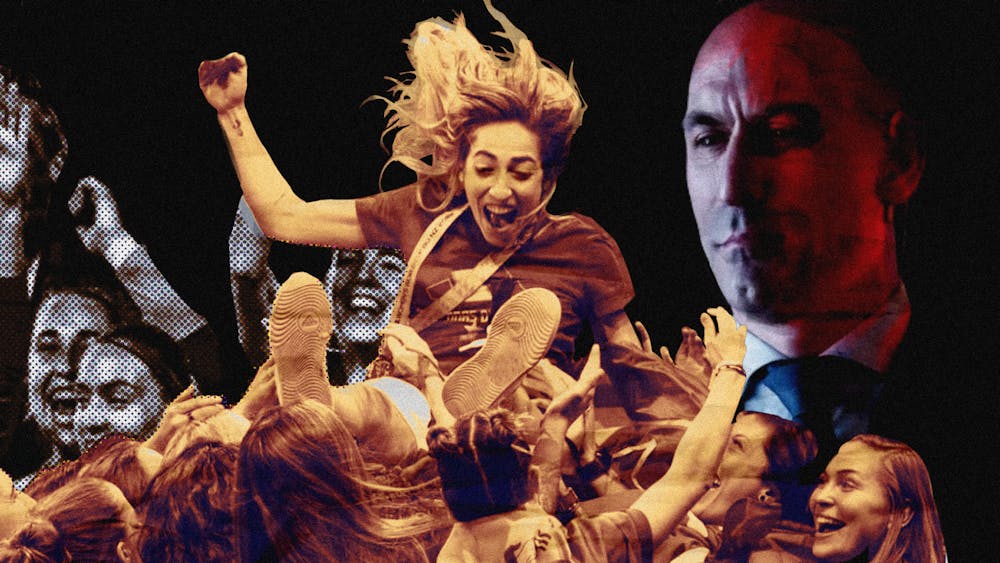
Having played soccer almost my entire life, the Women’s World Cup has always represented much more to me and many other young women than just a quadrennial tournament. Since 1991, it has showcased the best female talent of disparate nations and given them the equal opportunity to play the beautiful game on a global stage. Beyond the geopolitical significance of the tournament, it signifies the novel possibility that women can excel in sports, and that they can be taken seriously on a global stage.
Despite its putative celebration of women’s athletic abilities, the Women’s World Cup serves as a microcosm in which misogyny can operate powerfully in the implicit shadows. It is deeply ingrained in social culture that women’s sports are secondary to men’s sports.
Men have dominated representation in sports for a multitude of reasons. While yes, men are typically stronger and faster than women, professional men’s sports leagues have simply been around longer. The American professional men’s soccer league, Major League Soccer (MLS) was founded in 1993, while the National Women’s Soccer League was not founded until 2012. Both of these soccer leagues have predecessor organizations, with the men’s first league founded in 1968 and the women’s in 2001.
Despite the length of time men’s soccer has existed in the United States, somehow, it seemed that women’s soccer was able to evade that binarism in which women’s sports are typically rendered secondary. When I was very young, I didn’t realize it was a privilege to have female icons, such as Mia Hamm and Hope Solo, to look up to. And perhaps naively, as I grew older, I believed that the reverence with which society looks upon women’s sports would only grow over time.
But what is seemingly inextricable from progress is pushback. When asking some of my friends which athletes they looked up to, my first friend to respond, a girl, said Messi, who is a rightfully revered player. Then, my male friends started responding, with messages that only further reinforce my point. They said, “Megan Rapinoe’s hair,” “Brittney Griner,” and “Hope Solo,” sarcastically. Men’s sports are considered categorically above women’s at the most basic cultural level. It is generally implied to be a joke if a man were to say that his favorite player, or a player he looked up to, was a woman.
I had been considering this reality as I watched the US Women’s soccer empire falter this past summer: We were outperformed in nearly every match; our losses were fair. But I’ve never seen so many Americans react so giddily while bearing witness to this downfall. Reading the comment section of news posts about the United States' oust from the tournament was a disappointing reminder that despite the seeming progress of women’s sports in the cultural sphere, the hatred of misogyny will be waiting alive and well to celebrate our losses.
On Bleacher Report’s Instagram post, one commenter said: “Spend less time crying about equal pay you don’t deserve, then maybe you wouldn’t be crying on the pitch.” It received nearly 10,000 likes. Another commenter said: “... As an American, I am thrilled they lost!” This one received nearly 8,000 likes. Many others made sure to mock Megan Rapinoe as well, likely because of her political outspokenness.
What most directly evidences the unacceptable reality between women’s sports and athletes and the rest of our social environment is the recent resignation of Luis Rubiales, the former head of the Spanish soccer federation. The joy of Spain’s first Women’s World Cup title was quickly overshadowed by Rubiales’ unconsensual kiss of Jenni Hermoso during the televised awards ceremony.
In response to Hermoso’s accusation, “Rubiales accused Hermoso of lying about what he said was a kiss she had consented to.” But Rubiales’ reliance on the institutional power imbalance wasn’t enough. Hermoso’s teammates and fellow world champions — among other men’s players — refused to play again for Spain until Rubiales was removed from his post.
And while his resignation is wholly positive, it remains a part of the larger institutional response to scandals: resignation. It happens all the time. Instead of forcing us to contend with the fact that, institutionally, there exists an imbalance that breeds this kind of conduct, we treat each case as an isolated event. It puts the onus of change on survivors rather than on the system itself.
When the head of the Spanish soccer federation exhibits this behavior to the very players which he was supposed to serve, we must reconsider the ways in which our athletic, political, and cultural institutions reinforce regressive power imbalances. Women athletes, from high school, college, and beyond deserve the same reverence and celebration as their male counterparts for their achievements.
Although I am no longer a practicing athlete, I could go on forever about how important soccer was to my formation as a young woman. We can no longer accept this reality for the next generation of professional women athletes at any level in any sport. We must recognize where misogyny still operates, especially in spaces that should be free of it. And for all the wrongdoings against our female athletes, resignation can no longer be the right answer.

ALLISON SANTA-CRUZ is a College junior studying communications from Jackson, Miss. Her email address is allisant@sas.upenn.edu.
The Daily Pennsylvanian is an independent, student-run newspaper. Please consider making a donation to support the coverage that shapes the University. Your generosity ensures a future of strong journalism at Penn.
Donate



